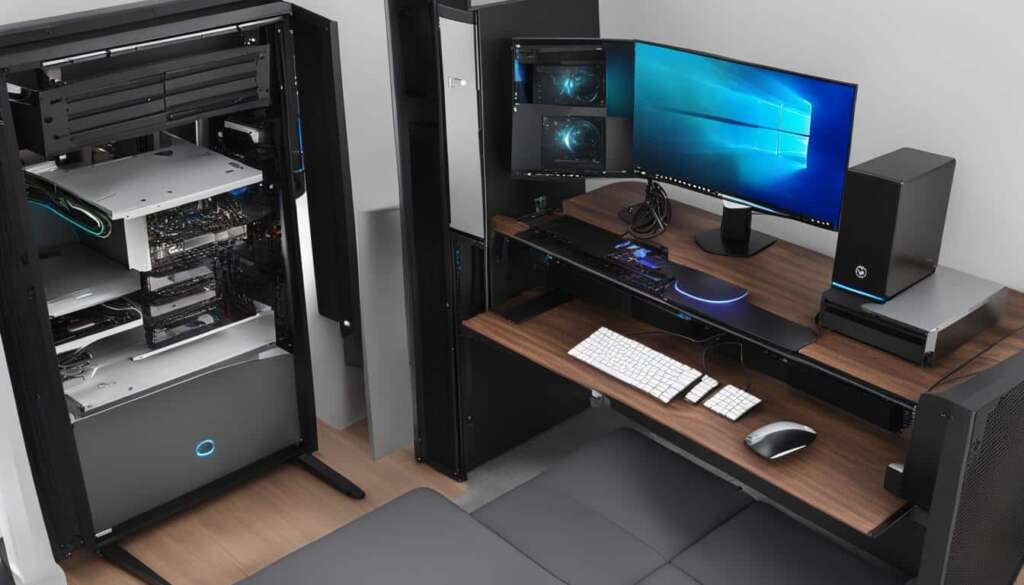Table of Contents
To kick off a custom PC business, having a solid plan is key. This plan should cover your aims, principles, market study, and money forecasts. There are tools to help draft your plan. Checking out a PC building guide gives insights into selecting parts and the assembly process.
Working out your initial expenses and getting funds are vital steps. Consider the cost of items like the PC casing, motherboard, and CPU. By assembling PCs yourself, you save on parts like memory, compared to pre-set products1.
Legally registering your venture and choosing the right business form is a must. Exploring the various business forms available helps in picking the right one for you2.
Setting up bank accounts, getting permits, and creating a finance management system are crucial. These steps ensure your ability to oversee your funds well. Following component manuals closely also prevents installation issues1.
Though startup costs for building PCs may be high, it pays off over time. Custom PCs often need fewer replacements1. They provide quick loading times for gamers or when using resource-heavy software compared to off-the-shelf PCs2. They’re also more dependable over time, showing fewer hardware problems2. Thorough research and making sure parts are compatible lead to selecting ideal parts for your needs. This ensures your PC meets specific demands like gaming, offering smooth play without delays or problems from unfit hardware2.
Key Takeaways:
- Writing a comprehensive business plan is crucial for starting a custom PC business.
- Estimating startup costs and securing funding are important steps in launching your business.
- Registering your business and selecting the appropriate business structure are legal requirements to consider.
- Opening accounts, obtaining permits, and setting up a financial accounting system are essential for operational efficiency.
- Thorough research, compatibility checks, and quality component selection are important for building a custom PC.
Writing a Business Plan
A well-written business plan is key when starting a custom PC business. It acts as a guide for your venture. It outlines your goals, strategies, and financial outlook. A detailed business plan helps you share your vision. It also attracts investors or helps get a business loan.
The business plan kicks off with an executive summary. This gives a snapshot of your company, its mission, and what makes it special in the custom PC world. It should grab the reader’s interest. It also shows the potential of your venture.
Then comes the business description. Here, you talk more about your custom PC business. You explain who you aim to serve and what you’ll offer them. Mention what sets your business apart from the rest.
The market analysis is crucial. It looks at the demand for custom PCs, identifies your customers, and spots trends. Consider the stats3 that predict the PC market’s size in 2024. This shows the revenue opportunities in the industry.
In the products or services section, describe the custom PCs you plan to sell. Talk about their quality and performance. Stress that high-quality parts are vital. The stats3 back up why quality matters more than price.
Financial predictions are vital too. Use data4 to guess the computing industry’s growth and your target markets. Make a detailed financial plan that shows your expected income, costs, and profits. This shows investors and lenders how your business can succeed and grow.
Lastly, explain your daily business operations. Discuss how you’ll get parts, build PCs, market them, and offer great customer service. Use stats3 to highlight the importance of keeping customers happy and informed throughout the building process.
In conclusion, your business plan must be professional, convincing, and well-structured. It’s a powerful tool for drawing in investors, securing loans, and guiding your business to success. Using stats3 and4 adds insights and credibility to your plan.
Estimating Startup Costs and Securing Funding
Starting a custom PC business means figuring out your initial expenses. These include one-time costs, labor, and ongoing expenses5. Your custom PC business will have its own unique costs, which change based on many factors.
Here are some key factors to consider when estimating your startup costs:
- Market Research: Market research might last 1-2 months and cost $500 to $10005.
- Business Plan: Writing a detailed business plan could take 2-3 months and set you back $1000 to $20005.
- Financial Modeling: Making a financial model often takes 1-2 months and costs $500 to $10005.
- Funding: Getting funds might require 3-6 months and $1000 to $5000, depending on your approach5.
- Legal Structure: Registering your business’s legal form can take 1-2 months and cost $500 to $10005.
- Permits and Licenses: Getting the needed permits and licenses can take 2-4 weeks and cost $500 to $10005.
- Location and Infrastructure: Prepping your workshop location might last 1-2 months and cost $2000 to $50005.
- Supplier Relationships: Starting relationships with suppliers could take 1-2 months and cost $1000 to $20005.
- Marketing Strategy: Crafting and launching a marketing strategy may last 2-3 months and cost $1000 to $30005.
Keep in mind, these costs are estimates and can change based on your situation and location6. Proper planning of your startup costs helps with budgeting and securing the needed funding.
For a deeper insight into estimating costs and finding funding, consider the WordPress Website Building Guide. It offers helpful advice for starting your custom PC business5.
Registering Your Business and Selecting a Business Structure
When you register your business, you make it official. This step is key to follow the rules and become recognized legally. Different places and business types have different rules for registering. Along with this, you’ll need to decide on the structure of your business. This choice will affect your business goals and needs.
A simple business structure is the sole proprietorship7. This means one person owns and runs everything. It’s good for small businesses and freelancers who are just starting. They don’t need to register formally with the state7. But, sole proprietors take on full responsibility for any debts or legal problems7.
If you want to protect your personal stuff from business problems, think about an LLC7. An LLC keeps your personal assets safe if the business owes money or gets sued8. Members of an LLC don’t pay corporate taxes. Instead, business profits and losses go on their personal tax returns8.
For bigger growth plans, a corporation could work8. It keeps legal issues and debts away from the owners. Businesses can keep running even when ownership changes8. But, C corporations can get taxed twice – once on profits, and again on dividends paid to shareholders8.
S corporations avoid this double tax. Their profits and losses go on the owners’ tax returns, much like an LLC8. This is better for small businesses that don’t want double taxation.
B corporations aim to create public benefits and profit. They must meet certain standards8. Nonprofits don’t pay taxes but must follow their mission8. Professional corporations protect some professionals from liability, but not from malpractice claims8. Close corporations work like partnerships and have share transfer limits8.
Choosing the Right Business Name
Choosing a business name is a big decision7. It needs to stand out and stick with your audience. Plus, it must not break any trademark laws.
Check if your name isn’t taken by another business. This avoids legal trouble and confusion. Make sure the name fits your marketing goals and strategy.
The Benefits of Business Registration
Registering your company brings many benefits. It proves you’re a formal business. This is important for contracts, deals, and financial matters. Plus, it makes your business look professional and trustworthy.
It’s also about protecting your ideas, like your name or logo. With registration, you stop others from using your intellectual property. This can save you from losing money or seeing others profit from your ideas.
Last, registration keeps you in line with laws, including taxes. Not registering can lead to fines or legal trouble. This could be hard for a new business7.
Resources for Business Registration
The journey to registering your business and picking its structure can feel huge, but help is out there. Here are some resources to consider:
| Resource | Description |
|---|---|
| Government websites | Visit the official websites of your local government or relevant agencies to access detailed information and resources on business registration procedures, requirements, and fees. |
| Small Business Development Centers (SBDCs) | SBDCs offer free or low-cost consulting services to help entrepreneurs navigate the process of starting and registering a business. They provide guidance on various aspects, including business structure, legal requirements, and funding options. |
| Professional services | Consider engaging the services of an attorney, accountant, or business advisor who specializes in business registration and structuring. They can provide expert advice tailored to your specific needs and ensure compliance with all legal requirements. |
Utilize these resources to solidify your business’s foundation. By doing so, you’re paving the way for a successful entrepreneurial journey.
Setting Up Financial and Operational Systems
After you’ve registered your custom PC business, setting up a strong financial system is key. This system helps track your spending, earnings, and taxes. Using software for accounting or hiring a bookkeeper can make this easy and ensure your records are correct9.
Next, it’s vital to make a detailed business budget. This lets you look at your expected costs and income. With this info, you can make smart choices and use your resources wisely. Remember to regularly check and tweak your budget as your business grows9.
It’s a good idea to open a bank account just for your business. This separates your personal money from your company’s. It makes managing your money easier, looks more professional, and helps with tax time. It also keeps you right with financial laws9.
To legally run your custom PC business, you must have the right licenses and permits. Make sure to research what your business specifically needs. This prevents legal issues later on. Following these rules shows you’re serious and helps gain your customers’ trust9.
FAQ
How important is it to have a business plan when starting a custom PC business?
A well-thought-out business plan is key for a start-up, like a custom PC shop. It shows your aims, values, and looks into the market and finances. This plan is also great for attracting investors or getting a loan.
What should be included in a business plan for a custom PC business?
Your business plan needs a few key sections. Include a clear executive summary and your products or services info. Add market research, financial forecasts, and how you’ll run the company. The detail depends on how complex your idea is.
How can I estimate startup costs for my custom PC business?
Knowing your startup costs helps get funding and figure out when you’ll make money. Cover one-time costs, ongoing expenses, and emergency funds. It’s vital for smooth early days.
What are some funding options for a custom PC business?
You can look at investors, loans, or crowdfunding for your custom PC startup. Different options work for different businesses. It’s crucial to find the right match.
What are the legal requirements for registering a custom PC business?
Choosing a structure for your PC venture is the first step. Options include sole proprietorships and more complex setups like LLCs. Each has its own legal rules. Also, pick a unique name that’s legally available.
What financial and operational systems should I set up for my custom PC business?
After registering, set up a financial system. This can mean hiring help or using software. Make a budget and open a business bank account. Also, check what licenses or permits you need. It’s important to follow all legal requirements.
Source Links
- https://www.crucial.com/articles/pc-builders/how-to-build-a-computer – How To Build Your Own PC | Parts, Budget, Step-by-Step
- https://www.davescomputers.com/benefits-of-custom-built-pc/ – Benefits of Custom Built PC – Daves Computers
- https://launchspace.net/blog/guide-to-start-pc-building-business/ – The Ultimate Guide To Starting Your Own PC Building Business
- https://www.bplans.com/computer-repair-business-plan/ – Computer Repair Business Plan Example – Bplans
- https://finmodelslab.com/blogs/how-to-open/how-to-open-custom-pc-building-service – How To Launch Your Custom PC Building Service Today!
- https://finmodelslab.com/blogs/startup-costs/custom-pc-building-service-startup-costs – How to Plan for Startup Costs to Launch a Custom PC Building Service
- https://blog.hubspot.com/sales/sole-proprietorship – Sole Proprietorship 101: The Easy Guide to Setting One Up
- https://stripe.com/resources/more/should-you-form-an-llc-or-a-corporation-for-your-startup – LLC vs. corporation for startups: How to choose | Stripe
- https://www.linkedin.com/advice/0/what-most-important-steps-starting-computer-hardware-xy35c – What are the most important steps to starting a computer hardware business?








